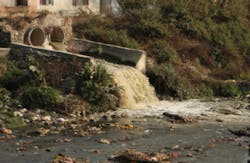Water reuse: Potential for expanding the U.S. water supply through reuse of municipal wastewater
In this century, the challenge is to address how the U.S. can provide sufficient quantities of high quality water to an ever-increasing demand from a growing population. The National Research Council’s (NRC) Water Science and Technology Board invited a 14-member committee from the water technology industry and other disciplines to perform an assessment on how to meet future water supply needs. “Water Reuse” summarizes the nation’s recent water use and discusses what to expect and what options are available in the immediate future.
Despite the vast infrastructure, the demand for fresh water has increased substantially, creating shortages in public supply. Existing conventional supplies have been under pressure due to the growing population, urban development and climate change creating a shortage. A key focus is to expand water reuse by treating wastewater to increase the nation’s total available water resources, which can serve beneficial purposes in supplying drinking water, in addition for irrigation and industrial applications.
Redefining water management
The NRC Committee envisions a new era of water management that is essential for sustainability of the water supply across the U.S. and identifies a research agenda for making the most appropriate use of the resource. “Although reuse is not a panacea, the amount of wastewater discharged to the environment and the quality of this resource could play a significant role in the overall water resource picture,” writes the Committee. They also realized that water reuse might complement other strategies, such as water conservation.
For industry specialists, this report produces many insights on how to meet the challenges on future wastewater management. One of the more dynamic parts of the report discusses the new era of water management and how an expanding population will continue to have an impact, particularly in water-limited regions. The future depends upon water managers to address shortfalls in supply from conventional water sources.
Through enhanced conservation measures and improved technologies, water specialists have to encourage the development of new sources of water in areas facing extreme water shortfalls. Potable and nonpotable reuse can be used to draw attention to the development of new sources of water, particularly in locations encountering severe water shortages. To address these shortages, water specialists have to establish better management of water by more effective treatment processes.
Their analysis shows measuring municipal wastewater effluent discharged nationwide has increased due to more usage. According to the report, the reuse of coastal discharge in water-limited regions could be used to meet greater supply needs.
Modern technologies help reuse
The very nature of wastewater suggests chemical and biological contaminants can be present unless the reused water is treated. Modern technology can detect these contaminants at levels far below human and environmental health relevance. Such concentrations or ratios exceeding specific thresholds require treatment to mitigate the risks to human health.
“Water Reuse” uses near-term research priorities as the basis for presenting a portfolio of treatment options available to mitigate water quality issues in reclaimed water. New analysis indicates that the risk of exposure to certain microbial and chemical contaminants from drinking reclaimed water do not appear to pose any significant threats or compromise any water quality standards concerning current drinking water treatment systems.
Despite the risks, reclaimed water can in fact meet water quality standards through treatment processes and can be an effective solution for providing a viable water supply. For meeting these goals, the social, legal and regulatory issues and opportunities provide a framework to ensure water quality and to increase the volume of the water supply through wastewater management.
The report recommends that adjustments to the federal regulatory framework could enhance public knowledge of water reuse and provide uniform, nationwide health protection and consistency in the regulation of potable reuse.
Gerard Charles Frost is a chemical engineer who has worked in the water treatment industry for over 30 years. As the former owner of a water treatment company, Frost has a lot of experience in using water treatment techniques for commercial and residential applications. He and his daughter, Deirdre Frost, are actively involved in teaching and mentoring university students interested in water technology and engineering. Through teaching and writing, Frost and his daughter continue to inspire individuals to become passionate about water. For further details or comments, email the authors at [email protected].
